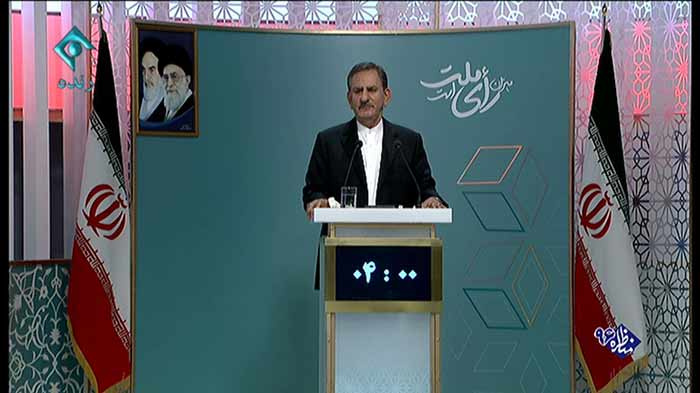Iran’s First Televised 2017 Presidential Debate, A Day After

(Picture: Vice President Eshagh Jahangiri at the tribune in Friday, April 28 debate.)
The first round of Iran’s televised presidential debate (our live coverage here) held on Friday mesmerized millions of viewers, many of whom had quietly boycotted the country’s state-run TV over what they presume as overt political bias. In spite of criticisms over the spineless questions posed to the candidates up for the country’s highest executive position, the debate seems to have successfully functioned as a warm-up to more heated discussions in coming days.
The two major political camps in Iran have set foot in the competition each with three men, one from each side considered by many as not being in the real game. The remaining four were under the magnifying glass during the debate, at the end of which many agreed that Vice President Eshagh Jahangiri had emerged as the superstar.
Vice President Eshagh Jahangiri identified himself as Reformist, who has run in an effort to voice the camp’s positions after years of unfair marginalization. He also undertook to advocate the Rouhani administration, skillfully correcting biased criticisms posed by the rivals. Jahangiri did not hesitate to name heavyweight Reformist and moderate figures Hashemi Rafsanjani and Akbar Nategh Nouri, sidelined over the past twelve years, breaking self-imposed taboos of the state-administered TV. Nonetheless, Jahangiri’s main accomplishment was in his bulldozing over Qalibaf, welcome in cyberspace with thousands of jokes and memes, most which called him “the real boss” of the debate. Some even seriously entertained the idea that it was a better option for the Reformists and moderates to persuade Rouhani for a withdrawal in favor of Jahangiri, a U-turn from their original plan.
Persian media outlets have also shared their own takes. Fararu has highlighted six points about yesterday’s debates, which start with Tehran Mayor Mohammad-Bagher Qalibaf’s aggressive approach against the Rouhani administration. The moderate website also hailed Jahangiri’s surprising moment of entry, being more in control than the President himself. Fararu then moved on to Qalibaf’s insistence on dividing the nation into 96 percent of ordinary people versus 4 percent of leaches (probably inspired by the 1% rhetoric in the United States), in order to launch a campaign wave against Rouhani. Then, came the lackluster performance of Ebrahim Raisi, where he avoided almost every challenge. As Fararu wrote, many observers believe Raisi will be eliminated from the race after this very first debate. The Principlists, claims the website, will have to choose between Raisi and Qalibaf. The fifth point noted in the Fararu article is Qalibaf’s efforts to reenact Ahmadinejad’s edge-guard strategy in the controversial debates of the 2009 presidential race, where he attacked Ayatollah Hashemi Rafsanjani and Akbar Nategh Nouri. However, Fararu pointed out Qalibaf’s plagiarizing from Mirhossein Mousavi’s famous sentence in response to Ahmadinejad’s alleged lies (“what we see today is a phenomenon staring at the camera and lying”), which was met with a heavy backlash on Iran’s cyberspace. Fararu quoted from a tweet, which labeled Qalibaf’s appearance as being a merger of Mirhossein Mousavi’s voice with Ahmadinejad’s face. Last but not least, the website briefly touched the unobtrusive impression Hassan Rouhani left on the viewer, possibly resulting from a division of labor between him and his Vice President Jahangiri. Rouhani, Fararu argued, seemed to be trying to maintain his posture as the sitting president.
In an op-ed published on the pro-reform Shargh Daily, political editor Maziar Khosravi argued that Qalibaf would most probably lose the swing votes he has been so dearly looking for. “Mohammad-Bagher Qalibaf is not a first choice for anyone. However, he could be a second for many. At least, this is what he and his media advisors are prone to think. This very trait has made him display an ‘amphibious’ character in the realm of politics, the easy target of which is to prey on ‘swing votes’ and the uncertain. If Ebrahim Raisi is counting on the ‘hard core’ of those loyal to Principlism for a win, Qalibaf is trying to attract the uncertain layers of both Principlist and Reformist camps’ voter bases. That provides insight into the fact that his twelve-year dossier in the Municipality includes the issuance of both a radical directive on segregation in subdivisions and permissions for the construction of ultramodern ‘malls’, a stage for middle and upper classes,” argued Khosravi.
The other bellwether Reform-oriented daily, Etemad newspaper also published an op-ed penned by Ahmad Shirzad, Reformist MP in the sixth post-Revolution Parliament, who began with criticizing the state TV for its banal handling of the debate, resembling it to a goalless draw at the end of a soccer match. He then moved on to argue that Ebrahim Raisi was the main loser of the debate, as he failed to materialize the exaggerated prelude devised for his campaign by mainstream Principlists.
Finally, as usual, bellwether hardliner Kayhan daily had its own interpretation of the debate, as an episode of soliciting accountability, during which the Rouhani administration appeared to be empty-handed. “The empty portfolio proved to be so fatal for the administration that the cover candidate’s rants failed to work vis-à-vis the questions posed and the evidence shown,” Kayhan wrote.

